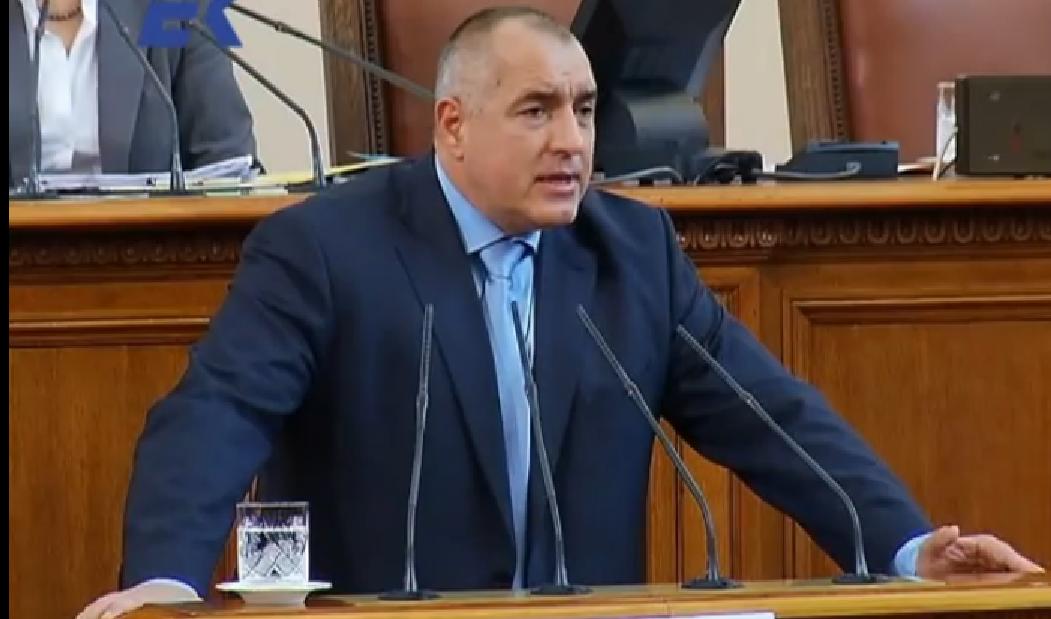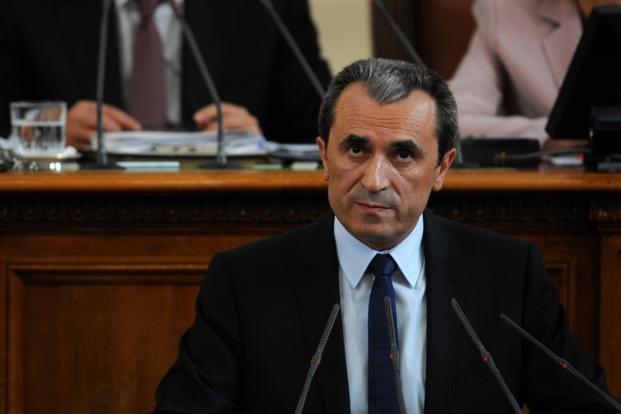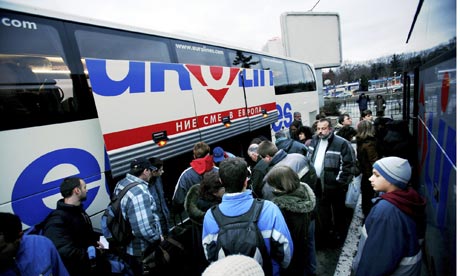 Bulgaria’s constitution includes a wide range of social rights. However, the ‘democratic, law-governed and social state’ has been characterized as ‘chronically incapable of coping with its social problems or improving its level of economic prosperity’ [1]. Moreover, the Bulgarian neoliberal ‘minimal state’ often cannot provide its citizens even with basic necessities, such as food, electricity, central heating, or medical care. The post-socialist radical and extensive privatization and economic restructuringhave led to systemic impoverishment, decimating entire sectors of the economy and society.
Bulgaria’s constitution includes a wide range of social rights. However, the ‘democratic, law-governed and social state’ has been characterized as ‘chronically incapable of coping with its social problems or improving its level of economic prosperity’ [1]. Moreover, the Bulgarian neoliberal ‘minimal state’ often cannot provide its citizens even with basic necessities, such as food, electricity, central heating, or medical care. The post-socialist radical and extensive privatization and economic restructuringhave led to systemic impoverishment, decimating entire sectors of the economy and society.
The state often has appeared to be merely a prize that players try to capture rather than a guarantor of law and the basic services necessary for civilized and decent life. The post-socialist reforms have resulted in acute inequalities and disenfranchisement [2]. With public discontent seemingly on the rise, strong social movements of ‘democratic populism’ and ‘redemptive radicalism’ increasingly capture the public vote [3].
Ecce Homo
Charismatic personalities are ‘at the heart’ of social movements. Thus, Bulgaria has been a country in search of its hero. Almost four years ago it seemed that he had appeared.
‘He is a man.’ The Bulgarian premier’s suit never embraced broader shoulders. Square-jawed, athletic, and a former bodyguard, Boyko Borisov had a reputation for crime-fighting. ‘Finally, there is a strong hand in Bulgaria’s politics,’ trembled a female voter. With Boyko Borisov at the helm, the center-right formation Citizens for European Development of Bulgaria, abbreviated in Bulgarian as GERB, won the 5th of July, 2009 parliamentary elections. Voters hoped for ‘European Bulgaria,’ with ‘European’ standards of living and no corruption; they hoped for a European Union (EU) with truly equal standing of states and people. The masculine, down-to-earth Borisov looked right for the job.
Borisov’s government stepped into a mixed legacy. Although, the living standards had improved, a series of corruption scandals had led to a decision by the European Commission (EC) to partially freeze European funding for infrastructure and other projects. Back in 2008, the top priority was tackling the rampant corruption and bringing to justice the powerful criminal groups. Borisov, once the top official in charge of the country’s police, pledged to eradicate organized crime and grapple with Bulgaria‘s corruption.
The art of government
Politics has been defined as ‘the art of government,’ and Borisov projected power and confidence. Yet, taking the helm under the banner of ‘anti-corruption,’ the new premier was soon called to address another challenge: the global financial crisis. However, navigating the seas of finance did not require brawn, but calculator. The charismatic masculine image of Borisov became the nice wrapping of the harsh policies designed by the former World Bank vice president Simeon Djankov, now the Minister of Finance. With notable arrogance Djankov compared Bulgaria’s budget to a small vegetarian pizza and sketched a course of fiscal austerity and welfare cuts. The government leitmotif was a blind copy of ready-made anti-crisis recipes, in which the lived Bulgarian reality and the needs of the Bulgarian society and economy were not taken into consideration.
But what was the social reality? In 2010, 43.6% of the Bulgarian citizens lived in material deprivation [4]. Although the EU poverty average was 16.9%, in Bulgaria it was 22.3%; or 1,673,000people in a population of 7,364,570. This picture had worsened throughout early 2013, yet the social purpose of the government continued to be squeezed down to a single point: financial stability. GERB’s social face was set in hard and miserly grimace, watching unflinchingly how people’s living standards sunk ever lower. Ongoing economic woes and failure to carry out the promised reforms steadily eroded Borisov’s popularity.
The Power of the ‘Bulgarian Spring’
Since 2004 a Molotiv cocktail of electricity/power has been at the epi(c)enter of a shaky triumvirate: the Bulgarian government, Electricity companies, and the People. Privatised in 2004, the energy distributing network was divided into three Energy Distributing Holdings (EDHs). These are de-facto ‘natural monopolies’ in the Bulgarian regions they service [5]. At the time of privatisation some expressed doubts and others foresaw troubles but in the rush to privatise, their objections were muffled.
January 2013; post-socialist, post-EU accession Bulgaria was hit by dauntingly high energy bills, considered by many to reflect unreasonably high domestic energy consumption. Numerous signals about incorrectly calculated and billed energy expenses led the public to believe that these were unjustifiably inflated in order to increase the EDHs revenues. More than 100,000 citizens daily voiced their anger. During the manifestations, which took place in all major cities across the country, the participants raised banners and shouted: ‘Nationalisation or death,’ ‘Mafia,’ ‘The energy Mafia out of Bulgaria,’ ‘Kick out the monopolies,’ and ‘Revolution.’ The economic crisis quickly escalated into a political one.
The protesters had both immediate and long-term grievances. The short-term demands of the public were of concrete political and economic nature. Politically, the people insisted that the government should resign. Economically, the demands were for ‘economic fairness’: revision of the electricity bills, and lowering the price of electricity. Borisov’s masculine vernacular appeal, which had initially swept voters off their feet, had now lost its magic. On the 20th of February, 2013 the premier submitted his cabinet’s resignation.
In response to the public protests the Bulgarian State Energy and Water Regulatory Commission (SEWRC) announced that it would launch an investigation into potential malpractice. [6]. On the 1st of March, 2013, 10 days after the government resigned, the organisation used its powers to lower the price of electricity [7]. Both the Bulgarian government and the energy monopolies had just ‘re-discovered,’ that the formula for calculating the price of energy should take into account not only shareholder revenue, but also consider social trust, justice, and equity.
The Future Ahead…
At the time of Borisov’s election, the media wrote admiringly: ‘He is a man,’ referring to his outward physical strength and manly appearance. GERB’s government mandate showed that the premier is also a man in his weakness, failings, and capacity to make mistakes… So, as Borisov walked out, has the image of the ‘strong man’ in Bulgarian politics also seen its sunset? ‘Djankovism,’ the governance rationale underneath Borisov’s charisma, saw the art of government as driven by the idée-fixée of macroeconomic stability, even at the expense of social and economic stability. It has now been thoroughly discredited.
Twenty years after the fall of the Eastern European block, Bulgaria’s transition to social market democracy has been disappointing [8]. Impoverishment and the drastic overhaul of the social-insurance, pension, and health-care systems have sown enormous personal insecurity.The pervasive weakness of the state has led to the narrowing of the real consummation of the already recognised social rights. A real shift in power, which would address the patterns of exclusion and social injustice, is yet to occur. Until that time, the Bulgarian premier’s seat could be taken again by yet another ‘strong man.’
Notes:
[1] Ganev, Venelin,”Bulgaria: The (Ir)Relevance of Post-communist Constitutionalism”, in Jan Zielonka, ed., Democratic Consolidation in Eastern Europe, vol. I: Institutional Engineering (Oxford University Press: Oxford, 2001): p. 186-211, p. 186.
[2] Dee Clark, Terry, Beyond post-communist studies: political science and the new democracies of Europe, (M. E. Sharpe. Inc: New York, 2002), p. 49.
[3] Zankina, Emilia, and Boris Gurov, “Populism and the Construction of Political Charisma: Post-transition Politics in Bulgaria,” Problems of Post Communism, Vol. 60, No. 1, January/February 2013, p. 3-17.
[4] ‘National strategy for poverty reduction and encouragement of the social inclusion,’ http://www.mlsp.government.bg/bg/docs/indexstr.htm(accessed 25/03/13).
[5] Natural Monopoly is a condition on the cost-technology of an industry whereby it is most efficient (involving the lowest long-run average cost) for production to be concentrated in a single firm. Perloff, Jeffrey, Microeconomics, (Addison Wesley: Boston, 2012), p. 394.
[6] ‘Rulebook of the State Commission for Energy and Water Regulation and of its Administration,’ (09/06/04).http://dker.bg/PDOCS/Ustroistven%20pravilnik.pdf (accessed 25/03/13).
[7] ‘Somebody pushed SWERC, it lowered twice the price of electricity in one day,’ News.bg, (01.03.2013), http://news.ibox.bg/news/id_1674252272 (accessed 25/03/13).
[8] According to Eurobarometer data, in 2010 the trust in the government and in the parliament had declined in comparison with 2009 as follows: (34%, -9, and 20%, -5). ‘Eurobarometer 74, Autumn, 2010,’ http://ec.europa.eu/public_opinion/archives/eb/eb74/eb74_publ_en.pdf (accessed 25/03/13).
In the May 2012 survey, the last date which the Eurobarometer has data for, the trust in the national institutions has declined even further, reaching (28%, -10 and 17%, -8). The impression that things are going in the wrong direction, had increased sharply (46% replied “wrong direction”, +11). 78% (-7) of the Bulgarians have been predominantly dissatisfied with the ways in which national democracy works. ‘Standard Eurobarometer 77, Spring 2012,’ http://ec.europa.eu/public_opinion/archives/eb/eb77/eb77_publ_en.pdf (accessed 25/03/13).






3 Comments